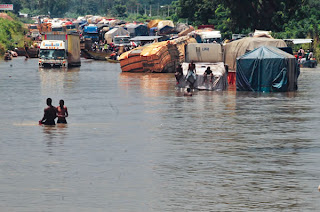''I heard floods are preventable'' ''really?''
Imagine my shock when I overheard this conversation between two well dressed young men at the lobby of a News organization...I didn't make conversation but was curious enough to continue to the end (eavesdropping you might say). At the end of it, no proper information was dispensed, just complaints of selfish politicians not doing what 'we' elected them to do. It was ironic though cos, as they talked, the sachets of water (pure water) and shells of the groundnuts they had eaten littered the once clean floor and as they left I only could wonder how many of us play such ignorance.
''Flooding means there's and excess of water on dry land.''
When we hear that floods are preventable, we quickly begin to think of that government project that isn't completed, that additional drainage that could have been built or how that the masses are suffering. We hardly stop to ponder the damage we do to the environment; the sachet of water, polytene bags in the gutter, heaps of industrial and household waste, constructing on water ways and so on...
In September, the city of Lokoja, in Kogi State Nigeria which is a major passage way from Nigeria's north to the south experienced what the local media termed ''the worst in the last 30 years''. Many see it as a rude awakening to every individual agency or government within sight.
With homes and businesses submerged Lokoja became the 'town under water'. The relief agency in Nigeria NEMA (national emergency management agency) says the flood resulted from the absence of buffer dams. who is responsible for building or even pointing out the need for such dams?
It's sad this could only be pointed out after damage to lives and property had been done.
This isn't a blame-game but a call to responsibility and being proactive.
Research show that, unclogging drains and building away from water ways can reduce risks of flooding in flood prone communities and could also be prevented by proper planning and preparation for the wet season.
The flood occurred when the Niger River overflowed its banks leaving residents wondering what happened and commuters in a deep end.
Such environmental hazards cause huge losses. loss if lives, property and even revenue.
In the period the Lokoja flood lasted, all economic activities from north to south grinded to a slow pace making trips that took several hours to span into days as well as several reported missing and dead.
What lessons did we learn from the floods across Nigeria? some say, travel light (cos of countless hours spent commuting incase u are caught in such situation) others say, proper town planning; I beg to add; care for our environment.
Waste management experts say, floods can also be stopped by adapting mitigation measures especially in flood prone areas.
so the next time you dispose of a tin,bottle,polytene bag/pure water sachet and any other form of waste remember it adds up.
one quick tip that helps keep me in check is ''never dispose anything in the absence of a bin''. So locate a bin, then dispose.
Imagine my shock when I overheard this conversation between two well dressed young men at the lobby of a News organization...I didn't make conversation but was curious enough to continue to the end (eavesdropping you might say). At the end of it, no proper information was dispensed, just complaints of selfish politicians not doing what 'we' elected them to do. It was ironic though cos, as they talked, the sachets of water (pure water) and shells of the groundnuts they had eaten littered the once clean floor and as they left I only could wonder how many of us play such ignorance.
 |
| once a highway... |
When we hear that floods are preventable, we quickly begin to think of that government project that isn't completed, that additional drainage that could have been built or how that the masses are suffering. We hardly stop to ponder the damage we do to the environment; the sachet of water, polytene bags in the gutter, heaps of industrial and household waste, constructing on water ways and so on...
In September, the city of Lokoja, in Kogi State Nigeria which is a major passage way from Nigeria's north to the south experienced what the local media termed ''the worst in the last 30 years''. Many see it as a rude awakening to every individual agency or government within sight.
 |
| overhead photo of community in Lokoja |
 |
| Nigerians, making a way |
It's sad this could only be pointed out after damage to lives and property had been done.
This isn't a blame-game but a call to responsibility and being proactive.
 |
| deserted homes |
Research show that, unclogging drains and building away from water ways can reduce risks of flooding in flood prone communities and could also be prevented by proper planning and preparation for the wet season.
 |
| when trucks weren't good enough |
Such environmental hazards cause huge losses. loss if lives, property and even revenue.
In the period the Lokoja flood lasted, all economic activities from north to south grinded to a slow pace making trips that took several hours to span into days as well as several reported missing and dead.
What lessons did we learn from the floods across Nigeria? some say, travel light (cos of countless hours spent commuting incase u are caught in such situation) others say, proper town planning; I beg to add; care for our environment.
Waste management experts say, floods can also be stopped by adapting mitigation measures especially in flood prone areas.
so the next time you dispose of a tin,bottle,polytene bag/pure water sachet and any other form of waste remember it adds up.
one quick tip that helps keep me in check is ''never dispose anything in the absence of a bin''. So locate a bin, then dispose.
No comments:
Post a Comment